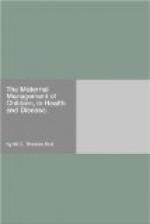This also may be given with impunity to the youngest infant; it is sweet to the taste, and mild in its operation. It should be exhibited in doses of one to two drachms in a little warm milk; or if it cause flatulence in this form, in some aromatic water, a desert spoonful of carraway-seed or dill water. For children above two years, it must always be given with some other aperient: thus, it may be combined with castor oil by the medium of mucilage or the yolk of an egg; in fact, it might be substituted for the syrup of roses in the previous prescription for castor oil.
MAGNESIA AND RHUBARB.
Magnesia, besides being a laxative, allays irritability of the stomach; it is consequently useful during dentition, at which period there is both much irritability and a prevailing acescency of the stomach. The dose is from five grains to ten for an infant, increasing the quantity to fifteen grains or twenty to children of nine or ten years of age. When taken alone the best vehicle is hot milk, which greatly quickens its aperient operation. And whenever the bowels are distended with wind, the pure magnesia is preferable to the carbonate.
It is well to mention here, that when the infant throws up the nurse’s milk it is generally curdled; a fact which leads the inexperienced mother to infer that the child is suffering from acidity; and to counteract the supposed evil magnesia is given again and again. This is a useless and pernicious practice, for curdling or coagulation of the milk always takes place in the stomach, and is produced by the gastric juice, and is so far from being a morbid process, that milk cannot be properly digested without it.
Rhubarb, it should always be recollected, has an astringent as well as purgative property, according to the extent of the dose in which it is administered; the former of which never opposes or interferes with the energy of the latter, since it only takes effect when the substance is administered in small doses, or, if given in larger ones, not until it has ceased to operate as a cathartic. This latter circumstance renders it particularly eligible in cases of diarrhoea, as it evacuates the offending matter before it operates as an astringent upon the bowels.
As a purgative it operates mildly, and may be given to the youngest infant; if from two to twelve months old, from three to six grains; for children above that age, the dose may range from ten grains to twenty. Its operation, however, is much quickened by the addition of magnesia; both of which are more effective when thus united than when given separately. The following form, in a costive and flatulent state of the bowels, will be found useful[FN#19]; a tea-spoonful or more may be given every three or four hours until the desired effect is obtained:—
Powdered rhubarb, half a drachm;
Magnesia, two scruples;
Compound spirits of ammonia, twenty drops;




